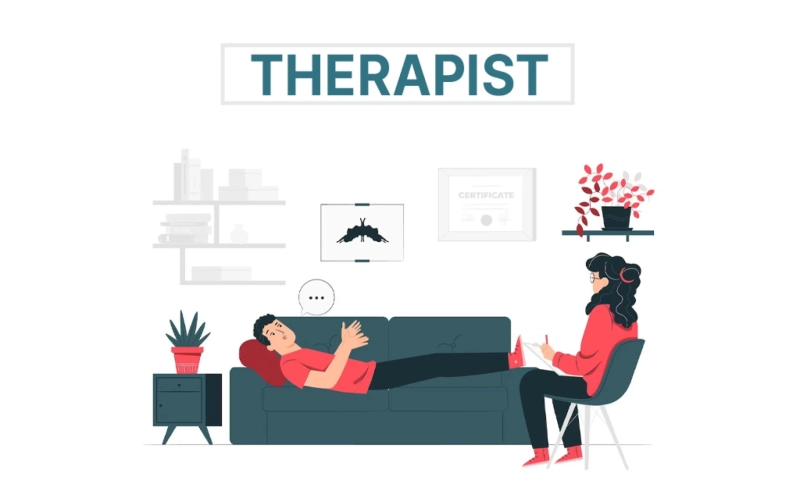Introduction:
Seeking the help of a skilled and compassionate therapist can be a valuable resource when dealing with relationship issues. Whether you're facing communication challenges, trust issues, or conflicts in your relationship, finding the right therapist can make a significant difference in your journey toward resolution and healing. In this article, we will explore effective strategies to help you find the best relationship issues therapist in the USA, ensuring that you receive the support and guidance needed to navigate through your relationship difficulties.
Assessing Your Needs:
Before embarking on your search for a relationship therapist, it's essential to assess your needs and goals. Take the time to reflect on the specific issues you're facing in your relationship and the outcomes you hope to achieve through therapy. Clarifying your needs will help you find a therapist who specializes in the areas most relevant to your situation.
Researching Therapist Specializations:
Relationship issues can vary greatly, from premarital counseling to marital conflicts, infidelity, or blended family challenges. Research therapists who specialize in couples therapy or relationship counseling. Look for Relationship Issues therapists with expertise in your specific area of concern to ensure that they possess the necessary skills and knowledge to address your unique needs.
Seeking Referrals and Recommendations:
One of the most effective ways to find a trusted relationship issues therapist is through referrals and recommendations. Reach out to friends, family, or colleagues who have undergone couples therapy and ask about their experiences. Their insights can help you gather a list of potential therapists who have already proven effective in working with relationship issues.
Online Directories and Resources:
Utilize online directories and resources to expand your search for a relationship issues therapist in the USA. Websites like Psychology Today, GoodTherapy, and the American Association for Marriage and Family Therapy (AAMFT) provide comprehensive listings of therapists, allowing you to filter your search based on location, specialization, and other relevant criteria. These platforms often include therapist profiles, bios, and information about their therapeutic approaches.
Checking Credentials and Licensing:
When researching potential therapists, it's crucial to verify their credentials and licensing. Look for therapists who are licensed in your state and hold appropriate certifications or memberships in professional organizations such as the American Association for Marriage and Family Therapy (AAMFT) or the American Psychological Association (APA). These credentials demonstrate that the therapist has undergone proper training and adheres to ethical standards.
Considering Therapeutic Approaches:
Different therapists may employ various therapeutic approaches when working with couples and relationship issues. Research and familiarize yourself with popular approaches such as Emotionally Focused Therapy (EFT), Cognitive-Behavioral Therapy (CBT), or Imago Relationship Therapy. Consider which approaches resonate with you and align with your therapeutic goals.
Reading Reviews and Testimonials:
Reading reviews and testimonials can provide valuable insights into a therapist's effectiveness and client satisfaction. Search for reviews on platforms like Google, Yelp, or therapist-specific websites. Pay attention to the experiences of clients who have faced similar relationship issues to get a sense of the therapist's ability to address those specific challenges.
Contacting and Interviewing Potential Therapists:
Once you have compiled a list of potential therapists, take the initiative to contact them and schedule initial consultations or phone interviews. This allows you to ask questions, discuss your needs, and gauge the therapist's compatibility with you and your partner. Consider asking about their experience, approach to therapy, success rate, and number of sessions typically required.
Assessing Therapeutic Fit:
Therapeutic fit is crucial to the effectiveness of couples therapy. During your initial consultation or interview, pay attention to how comfortable and understanding you feel with the therapist. Assess their level of empathy, communication style, and ability to create a safe and non-judgmental space. Trust your instincts and choose a therapist with whom you and your partner feel a strong connection.
Considering Logistics and Practicalities:
Practical factors such as location, availability, and cost should also be taken into account. Consider the therapist's office's proximity to your home or work, their availability for sessions, and whether their fees align with your budget. Keep in mind that therapy is an investment in your relationship's well-being, and finding a therapist who meets both your emotional and practical needs is essential.
Evaluating Progress and Reassessing:
Once you've chosen a relationship issues therapist and begun therapy, regularly evaluate your progress and reassess your needs. Reflect on whether you feel the therapy is addressing your concerns and whether you're experiencing positive changes in your relationship. Openly communicate with your Sugar Land Psychiatrist about any adjustments or additional areas of focus you'd like to explore.
Conclusion:
Finding the best relationship issues therapist in the USA requires careful research, consideration of your needs, and seeking referrals and recommendations. By utilizing online directories, checking credentials, reading reviews, and conducting interviews, you can make an informed decision. Remember that therapy is a collaborative process, and the relationship between you, your partner, and your therapist plays a crucial role in the success of the therapeutic journey. With the right therapist by your side, you can navigate through your relationship challenges, foster healing and growth, and build a stronger and more fulfilling connection.



